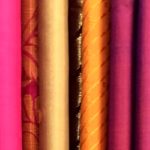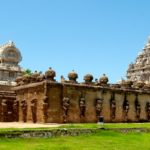Most of us associate the saree with just the weaving process. The loom in other words. Not so. The loom is but the last step in a multi-layered process. Before that, there is a whole ecosystem of people and professions– the dyer, the person who stretches and rolls the silk thread, to name two– all of whom are part of this weaving ecosystem.
It begins in this case in a small hamlet on the outskirts of Kanchipuram called Pillayar Palayam. At its height, there were 30,000 weaver families in this area. Today, there are 5000 who make their living from the clicking looms that punctuate the day.
In one of the tiny bylanes, a father and daughter are “pulling the silk thread,” (“Paa-vai izhukarathu). The daughter, Priya is clad– as most weaver-women are– in a green polyester saree. They weave the handlooms that they cannot afford. Or they choose synthetic sarees for their convenience.
It begins with the golden white silk yarn that stretches through the length of the strength. Priya and her father, who is called Naidu separate each yarn with their fingers so that it doesn’t mess up the loom.
Once the yarns are separated, the whole thing is folded and put away– ready for the next step, which is dyeing.




